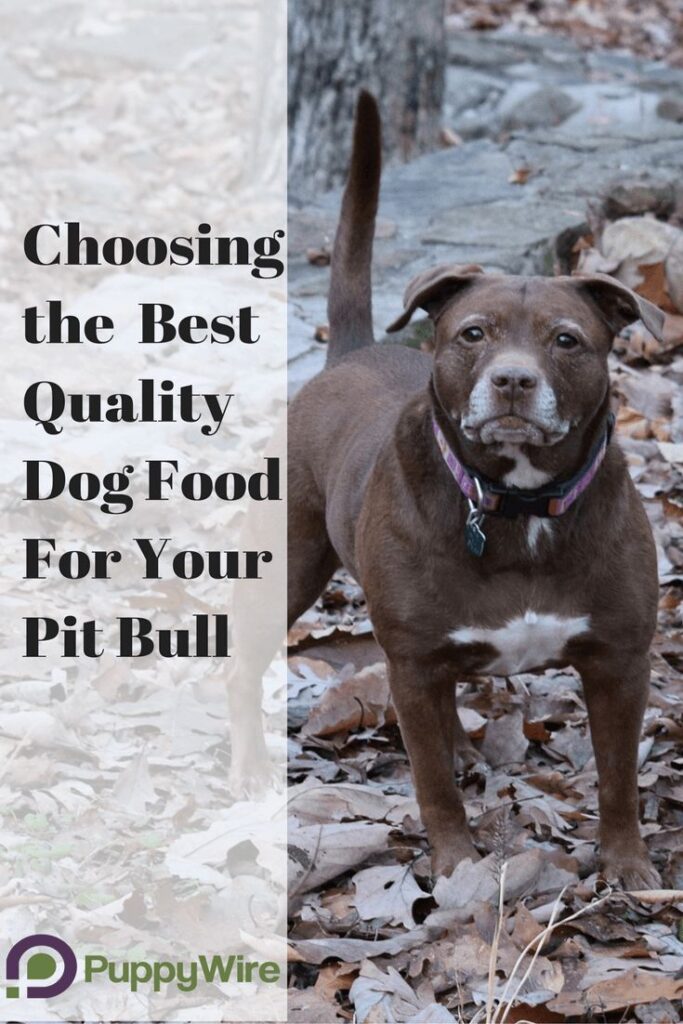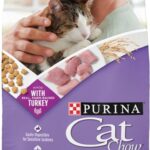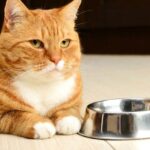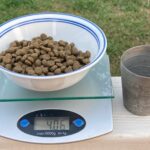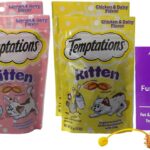The best dog food for Pitbulls supports muscle health and energy needs with high protein content. It should also include essential fatty acids for coat health.
Selecting the optimal dog food for a Pitbull is crucial to meet their unique nutritional requirements. These energetic and muscular dogs benefit from a balanced diet rich in proteins to support muscle development and maintenance. High-quality dog food for Pitbulls often contains real meat or meat meal as the first ingredient, accompanied by wholesome vegetables and grains that provide necessary vitamins and minerals.
Ideal formulations also include fatty acids like omega-3 and omega-6 to nourish their skin and coat. A precise blend of nutrients helps maintain their high energy levels, promoting overall well-being. It’s essential for pet owners to choose a brand that offers complete nutrition tailored for the robust nature of Pitbulls, ensuring their canine companions receive the nourishment they need for a healthy life.

Credit: www.dogfoodadvisor.com
Understanding Pitbull Nutritional Needs
Providing the right nutrition for your Pitbull is crucial in keeping them healthy and active. Knowing what nutrients your Pitbull needs can help prevent health issues and promote a fulfilling lifestyle.
Importance Of A Balanced Diet For Pitbulls
A balanced diet is imperative for maintaining your Pitbull’s overall health. This breed’s energetic nature requires a diet that is rich in proteins and fats to support their muscular build and high energy levels. Carbohydrates are also necessary but should be given in moderation to avoid excessive weight gain.
Feeding your Pitbull the right mix of nutrients can:
- Enhance muscle strength and endurance
- Boost the immune system to fight off diseases
- Promote healthy skin and a lustrous coat
- Support joint health, crucial for such an active breed
- Keep digestive functions running smoothly
Common Health Concerns Addressed Through Nutrition
Nutrition plays a significant role in managing health conditions commonly seen in Pitbulls. For instance, food allergies can cause skin irritation and discomfort. A diet free from common allergens such as corn, wheat, and soy can make a big difference.
To address other health concerns, consider a diet targeting:
| Health Concern | Nutritional Approach |
|---|---|
| Obesity | Controlled calorie intake, high in fiber and protein |
| Hip Dysplasia | Omega-3 fatty acids, Glucosamine, and Chondroitin |
| Heart Conditions | Taurine and L-carnitine enriched foods |
Key Nutrients And Their Functions In Pitbull Diets
Let’s break down the key nutrients essential for a Pitbull’s diet and their specific benefits:
- Proteins
- Proteins are the building blocks that support muscular health and repair tissue.
- Fats
- Fats provide energy, help absorb vitamins, and maintain healthy skin and coat.
- Carbohydrates
- While often less emphasized, carbohydrates are important for quick energy and fiber content aids in digestion.
- Vitamins and Minerals
- These support various body functions, including bone health, blood clotting, and nerve signaling.
- High-quality animal proteins like chicken, beef, or fish.
- Healthy fats such as flaxseed oil or fish oil for omega-3s.
- Complex carbohydrates from sources like sweet potatoes and green vegetables.
- A variety of vitamins and minerals found in fruits, vegetables, and supplements.
Finding The Best Dog Food For Your Pitbull
Selecting the most nutritious and suitable dog food for your Pitbull is crucial in fostering their health and happiness. A balanced diet is key, not just any dog food will do. Your furry companion’s well-being depends on a mix of the right nutrients to support their muscular build, energetic demeanor, and overall health. Let’s dive into tailoring the perfect meal plan for your pooch.
Personalizing Your Pitbull’s Diet
Just like humans, every Pitbull is unique. Weight, health, and even preferences come into play. Personalize your pup’s diet by considering high-quality protein sources, healthy fats, and carbohydrates. This isn’t about one-size-fits-all; it’s about crafting a meal plan as individual as your Pitbull.
- Protein content: Essential for muscle development and maintenance.
- Fats: Provide energy and keep the coat shiny.
- Carbohydrates: Offer sustained energy and should come from complex sources like sweet potatoes.
Considering Pitbull Activity Levels And Age
Pitbulls brim with energy and require diets that fuel their active lifestyle. Puppies, adults, and seniors have differing nutritional needs:
| Life Stage | Energy Needs | Key Nutrients |
|---|---|---|
| Puppy | High (growth) | DHA for brain development, calcium for bones. |
| Adult | Moderate to High | Balanced Omega fatty acids, glucosamine for joints. |
| Senior | Lower (less active) | More fiber for digestion, reduced calories to prevent weight gain. |
Dietary Adjustments For Pitbulls With Special Needs
Some Pitbulls may have food sensitivities or special dietary requirements that necessitate customized food plans. Take into account:
- Grain-free options for dogs sensitive to grains.
- Limited ingredient diets for managing allergies.
- Supplements like probiotics for gut health, especially for those with sensitive stomachs.
Always consult your veterinarian before making any major changes to your dog’s diet, especially for Pitbulls with health issues.
Best Dog Food For Pitbulls: Top Nutrition Picks!
As the proud owner of a muscular and energetic Pitbull, ensuring your furry friend gets the best nutrition is crucial. Pitbulls, known for their strength and vitality, require a balanced diet rich in protein and healthy fats to maintain their robust physique and support their active lifestyle. In the search for the ultimate meal plan, here we dive into the best dog foods tailored for Pitbulls, highlighting leading brands, optimal nutritional profiles, and the ongoing debate between wet and dry food options.
Characteristics Of High-quality Dog Foods
Identifying premium dog food for your Pitbull revolves around several key attributes:
- Abundant, high-quality protein sources like whole meats or meat meals to support muscle development and repair
- A healthy balance of fats and carbohydrates to fuel their energy needs
- Essential vitamins and minerals to promote overall well-being
- Omega fatty acids for skin and coat health
- Fiber-rich ingredients for optimal digestive function
- No fillers, artificial preservatives, or colorants that could harm your pet
Recommended Brands And Their Nutritional Profiles
Several brands stand out when it comes to delivering top-tier nutrition for Pitbulls. Here are a few favorites:
| Brand | Protein Content | Fat Content | Key Ingredients |
|---|---|---|---|
| Taste of the Wild | 32% | 18% | Bison, lamb meal, chicken meal, sweet potatoes, peas |
| Blue Buffalo Wilderness | 34% | 15% | Deboned chicken, chicken meal, peas, pea protein, tapioca starch |
| Orijen Original | 38% | 18% | Chicken meat, turkey meat, whole herring, chicken liver, turkey liver |
These products are formulated to meet the nutritional requirements for all breeds and sizes, ensuring your Pitbull gets the best.
Wet Food Vs. Dry Food For Pitbulls
The debate between wet and dry dog food continues, with each offering its own benefits:
- Wet Food: Often more palatable, higher in moisture content, and can be better for hydration and dogs with dental issues.
- Dry Food: Usually more cost-effective, convenient for storage, helps with teeth cleaning due to its crunchy nature, and provides more calories per serving.
Combining both wet and dry foods in your Pitbull’s diet can be advantageous, offering the best of both worlds in terms of texture, taste, and nutritional benefits. This approach also caters to picky eaters, ensuring mealtime is always enticing.
Reading Dog Food Labels Like A Pro
Reading Dog Food Labels like a Pro is your crash course in making informed decisions for your Pitbull’s nutrition. With countless options on the market, selecting the best dog food for your Pitbull can be a challenge. But fear not, by mastering the art of label reading, you can confidently pick a dietary champion. Labels are more than just fancy packaging; they hold the key to understanding what you’re feeding your furry friend. Let’s dive in and decipher the details behind those labels.
Identifying The Main Ingredients
The journey to premium nutrition for your Pitbull begins with a keen eye for high-quality ingredients. A label’s ingredient list is your first stop. Ingredients are listed in descending order by weight, which includes moisture content. This means that items listed first make up the largest part of what’s in the food, often a protein source. For a robust and muscular breed like the Pitbull, look for whole meats or meat meals (like chicken, beef, or lamb) as the first ingredient for that essential high-protein punch.
Understanding Nutritional Facts And Guarantees
Next, analyzing the nutritional facts panel is crucial. Here, you’ll find the guaranteed analysis which provides minimum percentages of crude protein and fat, along with maximum percentages of crude fiber and moisture. For Pitbulls, who typically lead a dynamic and energetic lifestyle, foods with a higher protein and fat content are generally recommended. Still, balance is key—the food should not be overly rich in fat as Pitbulls can be prone to obesity if not exercised regularly.
The Significance Of The Order Of Ingredients
Grasping the significance of ingredient order can truly elevate your label interpreting skills. As mentioned earlier, ingredients appear in order based on their weight, and this is directly impacted by moisture levels. Fresh meats can weigh more due to water content, so don’t be fooled—meat meals concentrated by removing moisture can actually offer more protein. While the first few ingredients make up the bulk of the food, those that follow are still important. Pitbulls can benefit from ingredients like Omega-3 and Omega-6 fatty acids, which can support a healthy coat and skin, and glucosamine for joint health.
Mixing Homemade Meals With Commercial Foods
Deciding on the best diet for your Pitbull doesn’t have to be a choice between homemade meals and commercial foods – a combination of both can often provide your furry friend with a well-rounded diet. Mixing homemade meals with commercial foods potentially offers your Pitbull the best of both worlds: the convenience and comprehensive nutrition of store-bought kibble along with the wholesomeness and versatility of home-cooked dishes crafted with love.
Benefits And Precautions Of Homemade Diets
Homemade diets allow you to take full control of what goes into your Pitbull’s bowl. Fresh ingredients, no preservatives, and tailor-made recipes cater to specific health needs align perfectly with a pet owner’s desire for quality. Yet, with these benefits come responsibilities and precautions. The key is to ensure nutritional balance – a task often overlooked but integral to your pet’s health.
- Ensure a balance of proteins, fats, and carbohydrates, alongside necessary vitamins and minerals.
- Avoid ingredients that are toxic to dogs, such as onions, garlic, and chocolate.
- Consult with a veterinarian or a pet nutritionist to prevent nutrient deficiencies or excesses.
Recipes For Balanced Homemade Meals For Pitbulls
A balanced homemade meal for your Pitbull should include high-quality proteins, fats, and carbohydrates, as well as essential vitamins and minerals. Here’s a simple recipe to get started:
| Ingredient | Quantity |
|---|---|
| Lean ground beef | 500g |
| Brown rice | 1 cup (cooked) |
| Chopped carrots | 1/2 cup |
| Peas | 1/2 cup |
| Calcium supplement (as directed by vet) | Appropriate dosage |
Remember, recipes may vary depending on the specific dietary needs of your Pitbull. Always consult with your vet before making any dietary changes.
How To Transition From Commercial To Homemade Food Safely
Transitioning your Pitbull to a homemade diet requires patience and caution to avoid gastro-intestinal upset. Start by introducing homemade meals gradually.
- Begin by substituting a small portion of the commercial food with homemade meal.
- Gradually increase the homemade portion over the course of one to two weeks.
- Watch your Pitbull closely for any signs of digestive discomfort or allergies.
- Ensure the homemade diet is providing all the essential nutrients. A nutritional supplement might be necessary to fill any gaps.
With careful planning and observation, the switch to a combined diet can contribute to a happier and healthier lifestyle for your Pitbull.
Supplementing Pitbull Diets Wisely
When it comes to taking care of your loyal Pitbull, ensuring they receive a balanced diet filled with all of the nutrients they need is paramount. However, even with the best dog food for Pitbulls, there are situations where your pooch might need an extra boost. This is where dietary supplements can play a critical role. Smart supplementation tailored to your Pitbull’s needs can propel their health and vitality to the next level, supporting everything from bone health to their shiny coat. Let’s look at how to supplement your Pitbull’s diet wisely.
When To Consider Adding Supplements
Understanding when to enhance your Pitbull’s diet with supplements is as important as the supplements you choose. Here are some circumstances that may warrant additional supplementation:
- Noticing a lack in energy or general wellbeing
- Recommended by a veterinarian due to specific health issues
- Changing life stages such as puppy growth, adulthood, or senior years
- Recovery from illness or surgery
- Diet variation resulting in potential nutrient gaps
Safe And Effective Supplements For Pitbulls
Selecting safe and effective supplements is crucial in supporting your Pitbull’s health. Here are popular choices that can provide tangible benefits:
- Fish Oil: Rich in omega-3 fatty acids, beneficial for skin, coat, and joint health.
- Glucosamine and Chondroitin: Supports joint health and mobility, especially important for active breeds like Pitbulls.
- Probiotics: Enhance gut health and digestion, contributing to the overall wellbeing of your dog.
- Antioxidants: Vitamins A, C, and E can help reduce the effects of aging and bolster the immune system.
- Protein Supplements: These can aid in muscle development, particularly for Pitbulls involved in regular exercise or training regimens.
Risks Associated With Over-supplementation
While supplements can have positive effects, over-supplementation poses considerable risks. Exceeding the recommended levels of certain nutrients can lead to health issues such as:
| Nutrient | Potential Risk |
|---|---|
| Calcium | Bone and joint problems, especially in growing puppies |
| Vitamin A | Dehydration, joint pain, and damage to blood vessels |
| Zinc | Impaired immune function and interference with mineral absorption |
| Iron | Gastrointestinal upset or organ toxicity at high levels |
Always consult with your vet before incorporating any supplements into your Pitbull’s dietary regimen. Doing so ensures that you avoid the pitfalls of over-supplementation and instead provide optimal support for your dog’s health and happiness.
Tailoring Diets For Pitbull Health Issues
Pitbulls, known for their loyalty and strength, also come with unique dietary requirements and health concerns. Customizing their diet is crucial in preventing and managing some of the breed-specific issues they face. The goal is to support their well-being through nutritionally balanced meals that cater to their individual needs. Let’s delve into how a well-thought-out diet can address common health problems in Pitbulls.
Addressing Allergies Through Diet
Allergies are a prevalent issue among Pitbulls, with symptoms ranging from digestive problems to skin irritation. Identifying allergens and opting for hypoallergenic food options can lead to considerable improvements. Here’s an approach to tweak their diet:
- Single protein source: Choose foods with a single animal protein to limit potential triggers.
- Grain-free formulas: These may be beneficial if a grain allergy is suspected.
- Natural ingredients: Minimize exposure to artificial additives known to exacerbate allergies.
Considering specialized hypoallergenic dog food or a home-cooked diet under the guidance of a vet can also be effective.
Managing Weight: Obesity And Underweight Concerns
Maintaining a healthy weight is essential for a Pitbull’s overall health. Here are some dietary strategies to tackle both obesity and underweight issues:
| Condition | Dietary Consideration |
|---|---|
| Obesity |
|
| Underweight |
|
Regular check-ins with a veterinarian ensure that dietary adjustments are on track and pitbulls are progressing towards optimal weight.
Supporting Senior Pitbulls With Dietary Adjustments
As Pitbulls age, their metabolism slows down and their nutritional needs change. Supporting them involves several modifications to their diets:
- Reduced calorie intake to prevent weight gain in less active seniors.
- Enhanced levels of joint-supporting supplements like glucosamine and chondroitin.
- Increased fiber for digestive health and regularity.
- Easily digestible proteins and carbohydrates cater to a slower digestive system.
Consultation with a vet for a tailored diet plan benefits aging Pitbulls, addressing individual health conditions and promoting a better quality of life.
Integrating Expert Advice Into Feeding Routines
For Pitbull parents, ensuring their beloved canine companion receives the best nutritional support is paramount. Integrating expert advice into your Pitbull’s feeding routine can greatly enhance their health and wellbeing. This guidance can be instrumental in crafting a diet tailored to your pet’s unique needs, helping them thrive at every stage of life. Let’s dive into how professionals can lead you and your beloved Pitbull toward optimal nutrition and care.
Working With A Canine Nutritionist Or Vet
Working with a canine nutritionist or vet is the first step in establishing a balanced diet for your Pitbull. These experts bring a wealth of knowledge about dog nutrition, specific breed requirements, and the latest research in pet health. They can recommend a feeding plan that includes the right balance of proteins, fats, carbohydrates, vitamins, and minerals.
- Individual assessment based on breed, weight, and activity level
- Advice on commercial diets and homemade food preparations
- Safe introduction of supplements if necessary
- Guidance on food allergies and sensitivities
Regular consultations ensure the feeding regimen evolves with your dog’s changing dietary needs.
The Importance Of Regular Check-ups
Regular check-ups play a critical role in maintaining your Pitbull’s health. Through these visits, vets can monitor your dog’s response to their current diet, making adjustments as needed. Health indicators such as weight, coat condition, and energy levels provide valuable insights into dietary effectiveness.
- Assessment of overall health and vitality
- Detection of any nutritional deficiencies or excesses
- Updates to dietary recommendations based on health changes
Scheduled check-ups contribute to the prevention of future health issues and ensure a proactive approach to your pet’s nutrition.
Monitoring And Adjusting The Diet As Your Pitbull Ages
As your Pitbull ages, their dietary needs will shift. Puppies, adults, and seniors have differing nutritional requirements. Younger dogs need more calories and specific nutrients to support growth, while older dogs may require a diet lower in calories and richer in joint-supporting supplements.
| Life Stage | Focus | Diet Adjustment Example |
|---|---|---|
| Puppy | Growth and Development | Higher protein and calorie content |
| Adult | Maintenance | Balanced nutrients for active lifestyle |
| Senior | Health Preservation | Lower calorie count, joint support additives |
It’s essential to adjust your Pitbull’s diet over time, accounting for their changing metabolism and health status. This dynamic approach to feeding ensures your dog maintains optimal health throughout every life stage.
Frequently Asked Questions Of Best Dog Fod For Pitbulls
What Is The Best Dog Food For Pitbulls?
The best dog food for Pitbulls supports muscle growth and energy needs. Look for high-protein content from whole meats, minimal fillers, and a balance of fats and carbohydrates to maintain healthy weight and energy levels.
How Much Food Should Pitbulls Eat Daily?
Pitbulls typically require about two to three cups of dry food per day, split between two meals. The exact amount can vary based on the dog’s size, age, and activity level. Always check with your vet for a personalized recommendation.
Can Pitbulls Eat Grain-free Diets?
Yes, Pitbulls can eat grain-free diets if they have grain sensitivities. However, grains are not inherently bad for dogs, and grain-free foods should be chosen carefully to ensure they meet all the nutritional needs of your Pitbull.
What Ingredients Should I Avoid In Pitbull Food?
Avoid ingredients like fillers (corn, soy, wheat), artificial preservatives, colors, and flavors. Prioritize foods with whole meats, vegetables, and healthy fats. Watch for common allergens that may affect Pitbulls, such as certain proteins and grains.
Conclusion
Navigating the vast choices of pitbull diets can be daunting. The right dog food fuels their energy and supports muscle health. Opt for high-quality ingredients, tailored to your pitbull’s age and activity level. Remember, a nutritious diet is key for a happy, healthy companion.
Ensure your pit’s vitality with the best dog food choices.
